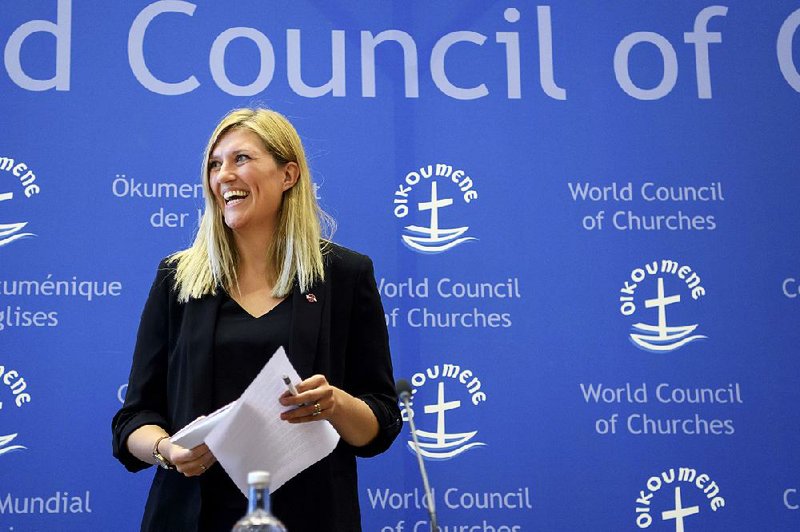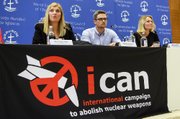BRUSSELS -- An international group dedicated to eliminating nuclear weapons won the Nobel Peace Prize on Friday, a recognition of efforts to avoid nuclear conflict at a time of heightened atomic menace.
The International Campaign to Abolish Nuclear Weapons was honored for its work to foster a global ban on the weapons, the Norwegian Nobel Committee said. The civil-society movement, which promotes nuclear disarmament around the world, was behind a successful push this summer for a U.N. treaty that prohibits nuclear weapons.
"We live in a world where the risk of nuclear weapons being used is greater than it has been for a long time," Berit Reiss-Andersen, chairman of the Norwegian Nobel Committee, said when she announced the prize in Oslo, Norway. "Some states are modernizing their nuclear arsenals, and there is a real danger that more countries will try to procure nuclear weapons, as exemplified by North Korea."
North Korean leader Kim Jong Un has hurled threats of nuclear missile strikes against the United States, and President Donald Trump has warned that he could "totally destroy North Korea" if provoked. North Korea's foreign minister said last month that the regime's possible next steps include testing a hydrogen bomb over the Pacific Ocean.
During the presidential campaign, Trump suggested the best path to addressing North Korea was to arm additional countries, such as South Korea and Japan, with nuclear weapons. And he once reportedly asked White House advisers why not use nuclear weapons, since the country possesses them.
Separately, Trump plans to "decertify" Iran's compliance with an international agreement that limits its nuclear program, a step that European allies worry could lead to nuclear proliferation.
Tensions also are escalating between India and Pakistan, and between the United States and Russia, all of which are working to improve their nuclear arsenals and delivery systems.
Beatrice Fihn, the Swedish executive director of the International Campaign to Abolish Nuclear Weapons, said in a telephone interview that it's because of the growing risk of nuclear war that the U.N. treaty to ban nuclear weapons and the awarding of her group with the Nobel prize are so important.
But, she said, "we do not have to accept" the risk of nuclear war.
"We do not have to live with the kind of fear that Donald Trump could start a nuclear war that would destroy all of us. We should not base our security on whether or not his finger is on the trigger," she said.
The campaign recognizes that nuclear weapons will not disappear any time soon. But Fihn said a ban is still a realistic long-term goal, similar to the way an international taboo was created around the use of chemical weapons.
"Keeping nuclear weapons legal isn't going to help things," she said.
The decade-old, Geneva-based campaign, which was modeled on international efforts to ban land mines and was formed to promote the implementation of the U.N. treaty, has branches in more than 100 countries.
U.N. TREATY SHUNNED
The Treaty on the Prohibition of Nuclear Weapons was approved by two-thirds of U.N. members in July, but it has not attracted support from any of the world's nine nuclear powers, which together possess nearly 15,000 atomic weapons. The United States and others boycotted the U.N. discussions that led to the treaty.
Nikki Haley, the U.S. ambassador to the United Nations, said at the time that "we have to be realistic" about the nuclear threat of rogue nations such as North Korea, and she warned that the ban could actually increase the risk of nuclear war, not reduce it.
Nuclear powers around the world repeated their opposition to efforts to ban the weapons after the Nobel announcement Friday.
"The Nuclear Ban Treaty does not move us closer to the goal of a world without nuclear weapons," NATO Secretary-General Jens Stoltenberg said in a statement. "In fact, it risks undermining the progress we have made over the years in disarmament and non-proliferation."
The White House and leaders of other nuclear powers have instead endorsed the nuclear Non-Proliferation Treaty, which went into effect in 1970 and which limits but does not ban the powerful weapons. Russia and the United States hold the world's largest stockpiles of nuclear weapons.
Meanwhile, the European Union's foreign-policy chief, Federica Mogherini, welcomed the decision to honor the International Campaign to Abolish Nuclear Weapons, saying in a tweet, "We share a strong commitment to achieving the objective of a world free from nuclear weapons."
Signatories to the nuclear prohibition treaty would be banned from developing, testing and possessing nuclear weapons, as well as threatening to use them. The treaty will go into effect once 50 nations ratify it. Guyana, Thailand and the Vatican were the first three to do so.
"This prize really is a tribute to the tireless efforts of many millions of campaigners and concerned citizens worldwide who, ever since the dawn of the atomic age, have loudly protested nuclear weapons, insisting that they can serve no legitimate purpose and must be forever banished from the face of our Earth," Fihn said.
The Norwegian Nobel Committee chose to recognize the campaign because of "its work to draw attention to the catastrophic humanitarian consequences of any use of nuclear weapons and for its groundbreaking efforts to achieve a treaty-based prohibition of such weapons," Reiss-Andersen said.
Asked whether the award was intended as a push-back to Trump's martial messages, Reiss-Andersen said that "we're not kicking anybody's leg with this prize. We are giving great encouragement."
The idea of a nuclear-free world as endorsed by the campaign got a prominent kick-start from an aging group of U.S. security hawks.
Former Secretaries of State George Shultz and Henry Kissinger, former Defense Secretary William Perry and former Sen. Sam Nunn, D-Ga., a bipartisan quartet with deep national-security credentials, made headlines in 2007 when they endorsed ridding the world of nuclear weapons. Their ideas helped kick off the anti-nuclear Global Zero movement.
Anti-nuclear campaigners say they recognize the challenge of persuading nuclear powers to agree to give up their weapons.
But the advocates believe that the treaty creates an international norm that will eventually pressure nuclear-armed countries into compliance, even if they never formally sign on, said Rebecca Johnson, executive director of Britain's Acronym Institute for Disarmament Diplomacy.
"Nuclear weapons became a tool for weak leaders to take shortcuts instead of providing their own people with safety, security and food," said Johnson, a founding co-chairman of the International Campaign to Abolish Nuclear Weapons. "We have to take that value away in order to pull down numbers to zero."
She said nuclear tensions between Washington and North Korea represent a setback to world peace.
"That has to be done with diplomacy and politics, and definitely not nuclear saber-rattling between Donald Trump and Kim Jong Un," she said. "They are very dangerous leaders that think they are exercising nuclear deterrence but in their irrationality are actually risking nuclear war."
Information for this article was contributed by Michael Birnbaum and William Branigin of The Washington Post; by Alexandra Zavis, Tracy Wilkinson and Barbara Demick of the Los Angeles Times; and by Mikael Holter and Sveinung Sleire of Bloomberg News.
A Section on 10/07/2017

